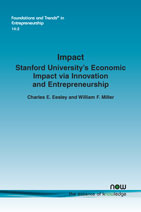Impact: Stanford University’s Economic Impact via Innovation and Entrepreneurship
By Charles E. Eesley, Stanford University, USA, cee@stanford.edu | William F. Miller, Stanford University, USA
Abstract
This report focuses on data gathered from a large-scale, systematic survey of Stanford alumni, faculty and selected staff in 2011 to assess the university’s economic impact based on its involvement in entrepreneurship. The report describes Stanford’s role in fostering entrepreneurship, discusses how the Stanford environment encourages creativity and entrepreneurship and details best practices for creating an entrepreneurial ecosystem. The report on the 2011 survey, estimates that 39,900 active companies can trace their roots to Stanford. If these companies collectively formed an independent nation, its estimated economy would be the world’s 10th largest. Extrapolating from survey results, those companies have created an estimated 5.4 million jobs and generate annual world revenues of $2.7 trillion.
Impact: Stanford University’s Economic Impact via Innovation and Entrepreneurship
Stanford University has a deep history in entrepreneurship and technological innovation. For more than a century, the university has incubated ideas, educated entrepreneurs and fostered breakthrough technologies that have been instrumental in the rise and constant regeneration of Silicon Valley, and, at the same time, contributed to the broader global economy.
Impact: Stanford University’s Economic Impact via Innovation and Entrepreneurship focuses on data gathered from a large-scale, systematic survey of Stanford alumni, faculty, and selected staff in 2011 to assess the university’s economic impact based on its involvement in entrepreneurship. The report describes Stanford’s role in fostering entrepreneurship, discusses how the Stanford environment encourages creativity and entrepreneurship, and details best practices for creating an entrepreneurial ecosystem. The report on the 2011 survey, estimates that 39,900 active companies can trace their roots to Stanford. If these companies collectively formed an independent nation, its estimated economy would be the world’s 10th largest. Extrapolating from survey results, those companies have created an estimated 5.4 million jobs and generate annual world revenues of $2.7 trillion.
